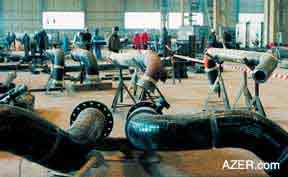|

Autumn 2001 (9.3)
Page
88
Azerbaijanis
on the Job
Azfen:
Joint Venture Between Azerbaijan and Turkey
  Ten years ago, a joint
venture between Azerbaijan and a Turkish company would have been
unthinkable. Yet, in January 1996, SOCAR and Turkish company
Tekfen set a precedent for Azerbaijan by establishing Azfen.
Their goal was to enable local Azerbaijani enterprises to participate
in international oil contracts and tenders. Ten years ago, a joint
venture between Azerbaijan and a Turkish company would have been
unthinkable. Yet, in January 1996, SOCAR and Turkish company
Tekfen set a precedent for Azerbaijan by establishing Azfen.
Their goal was to enable local Azerbaijani enterprises to participate
in international oil contracts and tenders.
"Our purpose is to bring the latest Western technology and
Western standards to Azerbaijan," says Azfen's General Manager,
Ismayil Mammadov, who has been with SOCAR since he graduated
from university in 1971.
Photo: Azfen's General Manager,
Ismayil Mammadov.
The Azfen joint venture became the first local construction company
to win an international tender, and so far, is the only one to
work directly with BP. Mammadov says that other local construction
companies exist, but they have yet to win any tenders on their
own: "These companies do a good job, but they've only worked
as subcontractors on projects. They don't yet have the capability
to compete for international tenders."
Out of Azfen's 350 employees, only four are Turkish - the rest are Azerbaijani.
To acquaint these workers with Western standards for construction,
Tekfen has trained and tested Azfen's employees in engineering,
welding and assembling as well as safety measures. "We've
brought our workers to the level that meets today's demands,"
Mammadov says. "For each project, all of our workers, especially
the welders, were tested under the supervision of BP and given
certificates."
  Left: View of western pipeline to Georgia,
one of Azfen's major projects. Left: View of western pipeline to Georgia,
one of Azfen's major projects.
Since Azfen is locally based and hires mostly Azerbaijani employees,
its costs for completing a project are lower. "Azfen has
the advantage of being a local company, and the majority of our
personnel are local people," Mammadov adds. "So we
can maximize the use of local labor. We're working to develop
the potential of local Azerbaijani engineers and workers by increasing
their knowledge from one project to another. We're still a young
company, but the fact that we can prepare proposals together
with Tekfen and other partners helps us from a technical point
of view."
In 1997, Azfen was contracted to construct the Azerbaijani section
of the Western route onshore pipeline, which carries oil from
the Sangachal terminal near Baku to the port of Supsa, Georgia,
on the Black Sea. Azfen and Tekfen, the principal construction
contractors for the project, also did construction work on the
Sangachal terminal and oil tanks.
Ten years ago, this type of arrangement would have been impossible.
During the Soviet period, all construction was planned by the
State. At that time, the concepts of competition and tender did
not exist. Quality was not necessarily the highest priority.
"Often, the State's planners didn't allow enough construction
time for a project," Mammadov recalls. "For example,
if a project required one year, those who represented the State
would only give it eight months. No doubt, that had a negative
effect on quality.
  Left: Inside Azfen's pipeline fabrication
facility near Baku. Left: Inside Azfen's pipeline fabrication
facility near Baku.
"I
don't mean to say engineers and companies from that time didn't
care about quality. There were high-level professionals during
the Soviet period, too. It's just that the conditions were different,
the demand was different and the standards were different."
For example, environmental standards were much more lenient than
they are now. "During the Soviet period, the goal was to
extract and transfer oil," he says. "The government's
standard relating to pollution was far too low to guarantee a
clean environment."
Another major difference between the construction of today and
that of the Soviet period is the increased emphasis on safety.
Azfen is well aware of the high standards that international
oil companies require for the safety of all employees. While
working on the Western Route pipeline project, the joint venture
was recognized by BP for its outstanding safety record: 3 million
accident-free man-hours.
"This means that none of the people working on that project
(from the project manager to the very last worker) experienced
an accident or dangerous situation," Mammadov explains.
"No one was injured or polluted the environment, and the
project was finished without a loss of time."
Mammadov hopes that more and more local enterprises will soon
join Azfen in becoming involved with Azerbaijan's oil development:
"In the future, I hope that more and more local companies
will appear and be able to meet today's demands."
____
From Azerbaijan
International
(9.3) Autumn 2001.
© Azerbaijan International 2001. All rights reserved.
Back to Index
AI 9.3 (Autumn 2001)
AI Home
| Magazine
Choice
| Topics
| AI Store | Contact us
Other Web sites
created by Azerbaijan International
AZgallery.org | AZERI.org | HAJIBEYOV.com
|